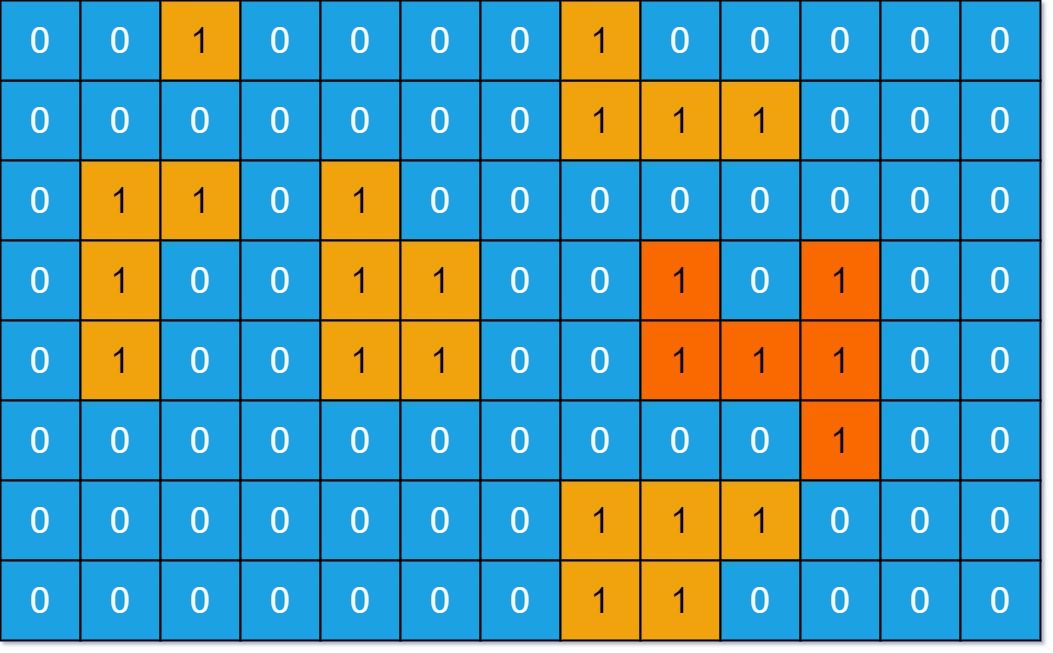Welcome to Subscribe On Youtube
695. Max Area of Island
Description
You are given an m x n binary matrix grid. An island is a group of 1's (representing land) connected 4-directionally (horizontal or vertical.) You may assume all four edges of the grid are surrounded by water.
The area of an island is the number of cells with a value 1 in the island.
Return the maximum area of an island in grid. If there is no island, return 0.
Example 1:

Input: grid = [[0,0,1,0,0,0,0,1,0,0,0,0,0],[0,0,0,0,0,0,0,1,1,1,0,0,0],[0,1,1,0,1,0,0,0,0,0,0,0,0],[0,1,0,0,1,1,0,0,1,0,1,0,0],[0,1,0,0,1,1,0,0,1,1,1,0,0],[0,0,0,0,0,0,0,0,0,0,1,0,0],[0,0,0,0,0,0,0,1,1,1,0,0,0],[0,0,0,0,0,0,0,1,1,0,0,0,0]] Output: 6 Explanation: The answer is not 11, because the island must be connected 4-directionally.
Example 2:
Input: grid = [[0,0,0,0,0,0,0,0]] Output: 0
Constraints:
m == grid.lengthn == grid[i].length1 <= m, n <= 50grid[i][j]is either0or1.
Solutions
-
class Solution { private int m; private int n; private int[][] grid; public int maxAreaOfIsland(int[][] grid) { m = grid.length; n = grid[0].length; this.grid = grid; int ans = 0; for (int i = 0; i < m; ++i) { for (int j = 0; j < n; ++j) { ans = Math.max(ans, dfs(i, j)); } } return ans; } private int dfs(int i, int j) { if (grid[i][j] == 0) { return 0; } int ans = 1; grid[i][j] = 0; int[] dirs = {-1, 0, 1, 0, -1}; for (int k = 0; k < 4; ++k) { int x = i + dirs[k], y = j + dirs[k + 1]; if (x >= 0 && x < m && y >= 0 && y < n) { ans += dfs(x, y); } } return ans; } } -
class Solution { public: int maxAreaOfIsland(vector<vector<int>>& grid) { int m = grid.size(), n = grid[0].size(); int dirs[5] = {-1, 0, 1, 0, -1}; int ans = 0; function<int(int, int)> dfs = [&](int i, int j) { if (grid[i][j] == 0) { return 0; } int ans = 1; grid[i][j] = 0; for (int k = 0; k < 4; ++k) { int x = i + dirs[k], y = j + dirs[k + 1]; if (x >= 0 && x < m && y >= 0 && y < n) { ans += dfs(x, y); } } return ans; }; for (int i = 0; i < m; ++i) { for (int j = 0; j < n; ++j) { ans = max(ans, dfs(i, j)); } } return ans; } }; -
class Solution: def maxAreaOfIsland(self, grid: List[List[int]]) -> int: def dfs(i: int, j: int) -> int: if grid[i][j] == 0: return 0 ans = 1 grid[i][j] = 0 dirs = (-1, 0, 1, 0, -1) for a, b in pairwise(dirs): x, y = i + a, j + b if 0 <= x < m and 0 <= y < n: ans += dfs(x, y) return ans m, n = len(grid), len(grid[0]) return max(dfs(i, j) for i in range(m) for j in range(n)) -
func maxAreaOfIsland(grid [][]int) (ans int) { m, n := len(grid), len(grid[0]) dirs := [5]int{-1, 0, 1, 0, -1} var dfs func(i, j int) int dfs = func(i, j int) int { if grid[i][j] == 0 { return 0 } ans := 1 grid[i][j] = 0 for k := 0; k < 4; k++ { x, y := i+dirs[k], j+dirs[k+1] if x >= 0 && x < m && y >= 0 && y < n { ans += dfs(x, y) } } return ans } for i := range grid { for j := range grid[i] { ans = max(ans, dfs(i, j)) } } return } -
function maxAreaOfIsland(grid: number[][]): number { const m = grid.length; const n = grid[0].length; const dirs = [-1, 0, 1, 0, -1]; const dfs = (i: number, j: number): number => { if (grid[i][j] === 0) { return 0; } let ans = 1; grid[i][j] = 0; for (let k = 0; k < 4; ++k) { const [x, y] = [i + dirs[k], j + dirs[k + 1]]; if (x >= 0 && x < m && y >= 0 && y < n) { ans += dfs(x, y); } } return ans; }; let ans = 0; for (let i = 0; i < m; ++i) { for (let j = 0; j < n; ++j) { ans = Math.max(ans, dfs(i, j)); } } return ans; } -
impl Solution { fn dfs(grid: &mut Vec<Vec<i32>>, i: usize, j: usize) -> i32 { if i == grid.len() || j == grid[0].len() || grid[i][j] == 0 { return 0; } grid[i][j] = 0; let mut res = 1 + Self::dfs(grid, i + 1, j) + Self::dfs(grid, i, j + 1); if i != 0 { res += Self::dfs(grid, i - 1, j); } if j != 0 { res += Self::dfs(grid, i, j - 1); } res } pub fn max_area_of_island(mut grid: Vec<Vec<i32>>) -> i32 { let m = grid.len(); let n = grid[0].len(); let mut res = 0; for i in 0..m { for j in 0..n { res = res.max(Self::dfs(&mut grid, i, j)); } } res } }